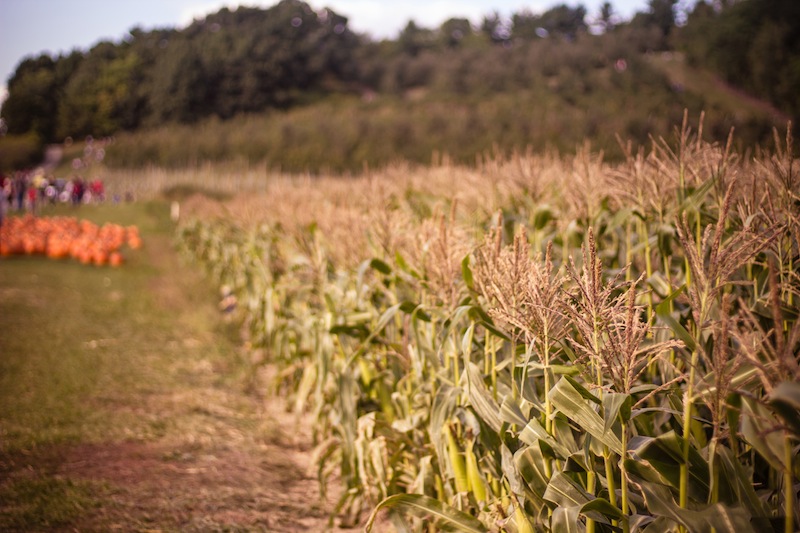"We are rapidly approaching a food crisis," writes Becker Smith, author of the new e-book "Canned Salmon." "Too much of our corn is raised for fuel and not food. Too much of it is raised to feed cattle and is virtually inedible to humans."
"Canned Salmon" came about when Smith decided to compile a book-length compendium of his many fascinating conversations with educator, philosopher, and visionary thinker Will Watman. Here's a shortened excerpt from the e-book, which you can download here.
The food crisis won't be solved or even delayed by the actions, however well intentioned, of dilettantes and culinary fashionistas. We need a combination of new farmers and new consumers, people who grow or prepare superior foods and ones who create a viable market for it. What practical steps may be taken?
1. Collective Farming
We talked about the possibilities of "gang activity" — approaching the challenges of survival with a group of trusted, mutually supportive friends instead of going it alone. This is nowhere more relevant than in the context of large-scale sustainable agriculture. It tends to attract people who care about food quality and environmental health as well as profit. That means people who want to work cooperatively, share equipment costs and contribute labor, and partake equally of profits and losses in the interest of scaling up. Think of the result as a family farm in which the "family" is linked by principle and shared purpose rather than biology, like the Hawthorne Valley Waldorf School in Hillsdale, New York, which operates its own 400- acre biodynamic farm. … A farming operation doesn’t just need farmers. It needs someone who can make a convincing case to bankers or investors. It may need someone with real business acumen to act as a consultant. It may need legal advice or someone who can negotiate grants, subsidies, and red-tape minutia. Believe it or not, these businessmen, potential investors, consultants, lawyers, and so forth, may be looking for ways to participate in the fight for healthier and more environmentally conscious foods, as well. The gang-owned and gang-operated farm holds so much potential for cooperative activity precisely because it needs far more than just farmers.
If you, the reader, don't know the first thing about farming and have no interest in it, ask yourself this: Do like-minded friends or I have some other type of expertise we could offer? Could we locate and organize small farmers? Could we conduct research and educate producers about the possibilities of scaling up?
The bigger-tent our attitude about who might collaborate, the better off we'll be. How we frame the enterprise is important. A solution associated with a subculture or fringe, whether fairly or not, is a solution that won’t get the wide exposure it deserves.
2. To Market: Cooperative Distribution and Making Stores Buy Local
Whether or not small farmers wish to take the big step and form production co-ops, they can profit immensely by forming marketing and distribution co-ops. We've already noted that the low production volume of most farmers’ market participants forces them to keep their prices artificially high. They are stuck selling what are essentially boutique goods.
"The fixed costs will always conspire against the little guy," Will says. "The truck, gas, and rent require volume sales to offset the overhead they represent. The seller gets caught in the middle. He either becomes a direct marketer of his product, through roadside stands or farmers' markets, or he tries to compete with the big grower for the chain buyer’s dollar." But absent significant volume, consumer demand for higher-quality goods is unlikely to have more than a slight effect on a wholesaler's interest in local product.
In simple economic terms, the demands for local foodstuffs — whether produce or cheese or meat — exists. The informed among us know we don't want produce picked before it's ripe, sprayed with paraffin, and transported great distances. We don't want to eat beef pent up and force-fed barely edible corn until it is essentially fat on four legs.
But mainstream distributors and retailers will never go to the trouble of buying better food unless there is a significant supply of it to hand. A well-managed distribution co-op comprising all the smaller producers in a given area is the way — the only way — to make this happen.
3. Don't Go at it Alone: Grants and Resources
We hear a lot about subsidies made available to farmers who produce corn for ethanol — the subsidies that play such an enormous role in compromising our food supply. The scale of what the small farmer or would-be small farmer must compete with boggles the mind, and for many this behemoth must be a source of despair. But there are, it bears emphasizing, also resources devoted to assisting those who want to rethink and remake our agricultural system.
The U.S. Department of Agriculture's Sustainable Agriculture: Information Access Tools tutorial, which "identifies outstanding sources that address sustainable agriculture, research and information sources, contacts and experts, research funding sources, [and] educational and career opportunities," links to a host of sustainable agriculture research funding channels, both federal and nongovernmental. That our government is making much of this available does not, needless to say, excuse the way in which it has systematically stacked the deck against sustainable practices. But a stroll through the types of research and innovation receiving funding is a wake-up call: those trying to make sustainable agriculture a vital competitor with Big Ag are long past the backyard hobby or feel-good CSA lot.
The research is there, and more is being done all the time. Sustainable agriculture is the future, and the more people who participate in the revolution, the more resources are going to be allocated to them.
If you have any questions for Will Watman, please send us a note at info@shareable.net, or reach out to us on Twitter or Facebook.
Header photo of Cider Hill Farm by Bonnie Kittle via unsplash.









